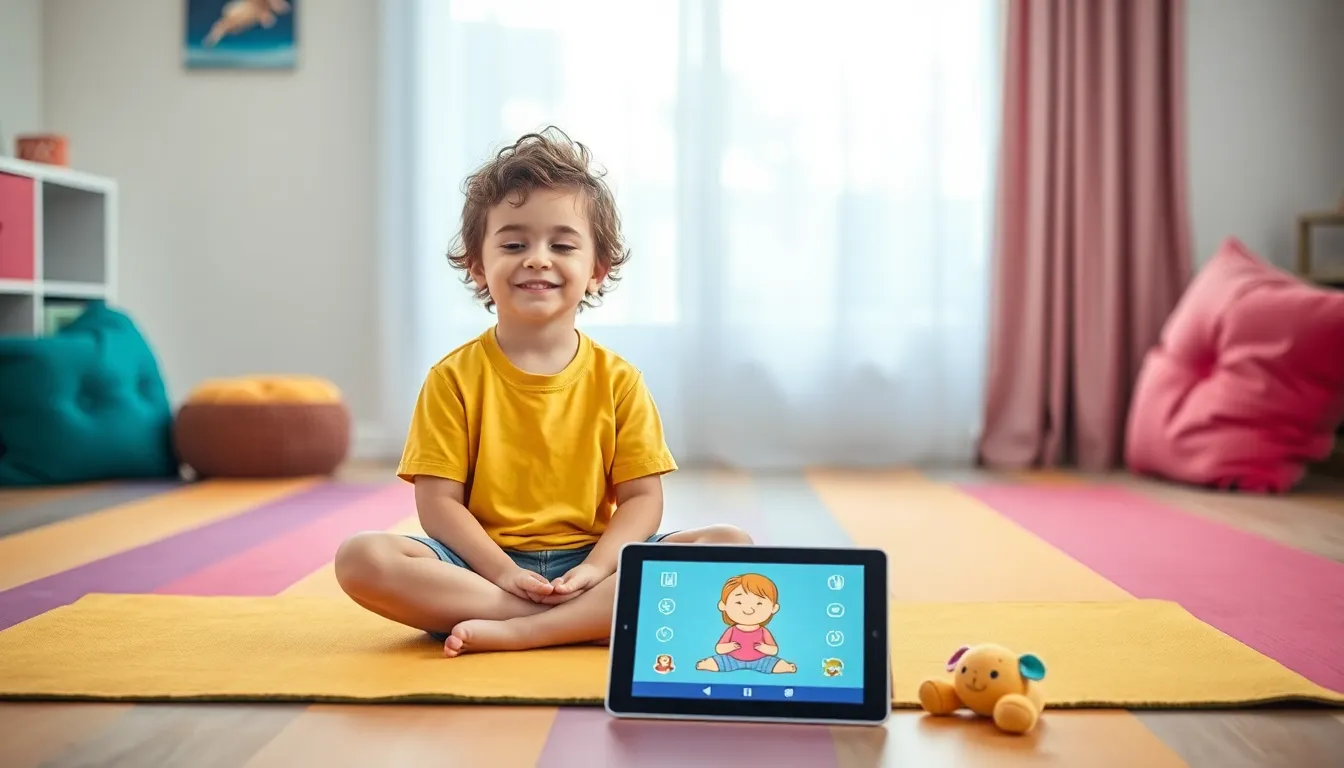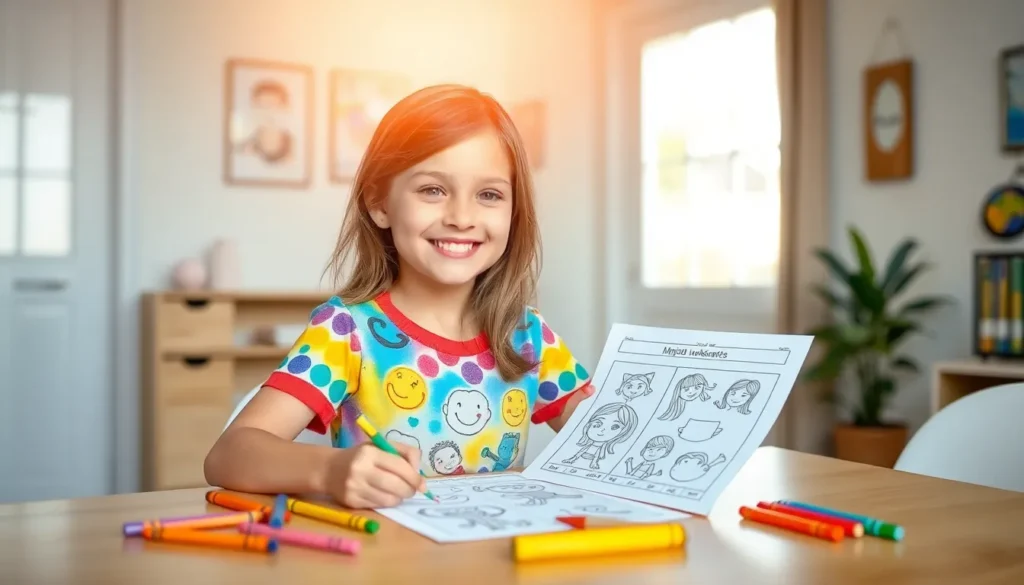Table of Contents
ToggleIn today’s fast-paced world, children face unique challenges that can lead to stress and anxiety. Mindfulness apps designed specifically for kids offer a fun and engaging way to help them develop essential coping skills. These digital tools introduce young minds to practices that promote emotional well-being and focus.
With colorful graphics and interactive activities, mindfulness apps make learning about meditation and relaxation enjoyable. They empower kids to navigate their feelings and build resilience, setting the foundation for healthier habits as they grow. As parents increasingly seek solutions to support their children’s mental health, these apps have emerged as valuable resources in fostering mindfulness from an early age.
Overview of Mindfulness Apps for Kids
Mindfulness apps for kids serve as educational resources that address the psychological needs of children navigating a hectic environment. These applications offer structured activities related to meditation, breathing exercises, and emotional regulation. They assist in building resilience by teaching children essential coping mechanisms to handle stress and anxiety.
Features of these apps include:
- Interactive Content: Engaging animations and gamified elements retain children’s attention.
- Guided Sessions: Step-by-step instructions help users practice mindfulness techniques effectively.
- Progress Tracking: Users can monitor their journey, which encourages regular practice and improvement.
Popular mindfulness apps include:
| App Name | Key Features | Age Range |
|---|---|---|
| Headspace for Kids | Short meditations tailored for young listeners | 5-15 years |
| Smiling Mind | Programs designed for various age groups | 7-12 years |
| Stop, Breathe & Think | Emotion check-ins paired with relevant activities | 6-12 years |
These apps not only foster emotional well-being but also promote focus and concentration. They provide a fun, accessible way for children to cultivate mindfulness habits. As these applications gain traction, they continue to evolve, integrating feedback from users and experts. This ensures they remain effective tools for emotional development.
Benefits of Mindfulness for Children

Mindfulness offers several benefits for children, enhancing their emotional and cognitive skills. Engaging with mindfulness practices nurtures resilience and well-being.
Emotional Regulation
Emotional regulation plays a crucial role in child development. Mindfulness activities, such as deep breathing and guided meditations, teach children to identify and manage their feelings. They learn to respond to stress with calmness, reducing instances of tantrums or meltdowns. Regular practice helps children understand emotional triggers, enabling them to express feelings appropriately. Research indicates that children who engage in mindfulness exhibit lower levels of anxiety and improved emotional responses (Keng et al., 2011).
Improved Focus and Attention
Improved focus and attention results from mindfulness practices that train the brain to concentrate. Mindfulness exercises encourage children to pay attention to the present, enhancing their ability to concentrate on tasks. Apps often incorporate fun activities designed to extend attention spans in an engaging manner. Many studies show that children who practice mindfulness experience increased cognitive flexibility and better performance in academic settings (Zeidan et al., 2010). Through regular use of mindfulness apps, children develop essential skills for academic success and daily life.
Popular Mindfulness Apps for Kids
Several mindfulness apps designed for kids aim to enhance emotional well-being and coping skills through engaging activities. Below are popular options that cater to various age groups and mindfulness objectives.
App 1: Headspace for Kids
Headspace for Kids offers guided meditations that help children relax and focus. The app features tailored sessions for different age groups: ages 5-7, 8-10, and 11-13. Kids can choose from themes like “Calm” and “Sleep,” promoting mindfulness through storytelling and animations. Progress tracking enables children to visualize their growth in mindfulness practices.
App 2: Smiling Mind
Smiling Mind provides structured programs based on age and mental health needs, suitable for ages 7 and older. The app includes a variety of mindfulness exercises that develop emotional resilience and focus. Parents can monitor progress through a dashboard, reinforcing the importance of mindfulness in daily life. The app emphasizes social and emotional learning through interactive content.
App 3: Stop, Breathe & Think Kids
Stop, Breathe & Think Kids encourages children to check in with their emotions before selecting mindfulness activities. The app features diverse activities, including breathing exercises, guided meditations, and emotion-building games. Kids ages 5-10 can enjoy the app’s playful design and engaging content, making mindfulness exciting and accessible while fostering emotional regulation skills.
These apps provide practical tools for parents seeking to support their children’s mental health through mindfulness practices tailored for their unique developmental stages.
Features to Look For in Mindfulness Apps
When selecting a mindfulness app for kids, consider key features that enhance engagement and usability. These features support children in effectively practicing mindfulness and developing essential coping skills.
User-Friendly Interface
A user-friendly interface simplifies navigation for children, allowing them to explore the app independently. Look for apps with intuitive designs that feature bright colors and engaging graphics. Apps that use simple icons and minimal text create a welcoming environment for young users. Ease of access to different sections, like guided meditations or exercises, increases children’s willingness to practice regularly.
Guided Meditations and Activities
Guided meditations and activities form the core of mindfulness apps for kids. Effective apps include a variety of sessions that cater to different age groups and emotional states. Look for programs that offer specific themes, such as calming anxiety, enhancing focus, or promoting gratitude. Short sessions—typically ranging from 3 to 10 minutes—suit children’s attention spans, while interactive activities encourage participation. For example, apps that combine storytelling with mindfulness techniques help keep kids engaged and encourage a fun learning experience.
Mindfulness apps for kids are essential tools that nurture emotional well-being and resilience in today’s fast-paced environment. By incorporating engaging features and tailored content, these apps empower children to develop coping skills and manage their emotions effectively. As parents increasingly seek ways to support their children’s mental health, these digital resources provide a fun and accessible introduction to mindfulness practices.
Encouraging regular use of these applications can lead to significant improvements in children’s focus, emotional regulation, and overall mental health. As the world continues to evolve, fostering mindfulness from an early age will equip children with the skills they need to navigate life’s challenges with confidence and calmness.




